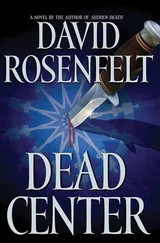I nod. “Okay, here are my terms. I’m going to get you protected by the state police; the judge has already ordered it. Once you’re safe, I will try to get you immunity. It’s not going to be easy, because generally a person in your position needs to reveal a part of his future testimony as a sign of good faith.”
I expect him to rebel against the idea of state police protection, but he does not. Maybe he’s not as confident and unafraid as he appears. He accepts my terms, which is not exactly a triumph for me, since those terms have been dramatically scaled back from my original goal. I’ve learned nothing, and according to Santiago I know nothing.
Business as usual.
I call Captain Dessens, who has disliked me for a very long time. We’ve had run-ins on a few cases, and he makes no effort to conceal his disdain for me. Therefore it gives me some pleasure to be able to give him his marching orders in this case, and I tell him that Santiago is ready to be picked up.
It takes Dessens’s officers about twenty minutes to get here, during which time Santiago and I sit in fairly uncomfortable silence. The frustrating part for me is that I believe him when he says he has the answers to my questions, and the logical extension of that is he probably can get Billy acquitted.
That is my primary goal, of course, but this situation has also become intellectually personal for me. If Billy were to get off tomorrow on a technicality, I would stay on this case, trying to find out the truth, for two reasons.
I don’t want whoever killed eighteen people to get away with mass murder.
And I’m sick of being in the dark.
CHAPTER 61
CAPTAIN ROBERT DESSENS WAS PISSED OFF. That would by no means qualify as breaking news; after twenty-one years on the job “pissed off” had become his natural order of things. But the situation he was now finding himself in kicked it up to a new level of annoyance.
First there was having to deal with Carpenter. As far as Dessens was concerned, defense lawyers placed just above pedophiles on the low-life scale, and Carpenter was the worst of the bunch. Dessens fully understood that defense lawyers had their job to do; he just would rather they did it on a planet other than earth.
He was not opposed to all possible dealings with Carpenter. For instance, he would take great pleasure in arresting him. But having to wait for Carpenter’s phone call, and then having to take his instructions on when and where to pick up the witness, was asking too much.
Then there was the witness himself. Dessens didn’t know Santiago, in fact knew almost nothing about him, which was precisely the point. The Erskine murder was a case that Dessens’s state police were not involved in, not even peripherally. They had more than enough on their plate already; to have to use manpower to protect Santiago was a drain that contained no upside.
As if all of that were not enough to drive Dessens nuts, he was being forced to deal with the feds. Almost as soon as Judge Catchings issued the order, Dessens received word from the state chief of police that FBI and US Army investigators wanted to question Santiago the moment he was taken into protective custody.
If Dessens were more introspective, he might have seen the irony. It was commonplace for him to be resentful at what he saw as intrusion by the feds in his cases. In this situation, he was experiencing the same feeling even though it wasn’t his case, and in fact he was resentful about being involved himself.
So Dessens found himself sitting in room 242 at the Marriott hotel, adjacent to the Paramus Park shopping center. With him were Special Agent Wilbur Briggs and US Army Captain Derek Meade. The room was what the hotel considered a junior suite, and sat at the far end of the hallway, flanked by two adjacent rooms that the state police had also taken over for their officers.
“You going to question him separately?” Dessens asked Briggs and Meade. Ordinarily he wouldn’t care what they did, except for the fact that he was under instructions from his chief not to leave until they were finished with their interrogation.
“No,” Briggs said. “And it won’t take long, because he won’t say a word without immunity.”
Meade nodded his agreement. “It’s jerk-off time.”
Dessens checked his watch. Twenty minutes since his officers picked up Santiago from Carpenter’s house. They should be showing up anytime. With any luck Dessens could be heading home in an hour, in time to watch the Yankees game from the West Coast.
While the men in the room did not expect Santiago to say anything when he arrived, the officers transporting him to the hotel couldn’t get him to shut up. Maybe it was nervous energy, but Santiago was waxing semi-eloquent on baseball, politics, police procedure, and women, not necessarily in that order.
Occasionally the two officers would make eye contact with each other in the front seat, conveying their common feeling that they would be quite happy when they deposited Santiago and got the hell out of there.
They pulled up to the front of the hotel, where another two officers were waiting. The two in the front seat got out of the car, while the two waiting scanned the area for any sign of danger. Seeing none, they opened the door, and Santiago got out.
The moment Santiago’s head rose above the car, it ceased to exist. A bullet crashed into it, entering through the right temple and exploding on impact.
The officers dove for cover. None was attempting to protect Santiago; they were not Secret Service, and he was sure as hell not the president. One look at him would have dissuaded them anyway; unless he had a spare head in the trunk, protecting him would be as futile an act as one could imagine.
M had used a silencer, and therefore the men in room 242 had no idea what happened outside. It was three minutes before the officers at the front of the hotel decided that the killer was no longer a present danger, and at that point they called Captain Dessens and told him what had happened.
Dessens immediately called homicide, which would come in with a full team. He, Briggs, and Meade rushed downstairs, but by that point there was nothing to be done.
Dessens knew that, just as certainly as he knew one other thing.
He was going to miss the Yankees game.
CHAPTER 62
JUDGES DO NOT CALL ME AT HOME. Not ever. There is more of a chance that the president of the United States will call and invite me to a state dinner, or that Tom Coughlin will call and ask me to quarterback the Giants.
A judge would view such a call as somehow crossing a line that judges have no interest in crossing. If they have something to tell me, and I happen to be at home, they have the court clerk call and summon me to their office.
So when I hear Judge Catchings’s voice on the other end of the phone, at ten PM, I immediately get a sick feeling in the pit of my stomach. I hate stomach-pit feelings, so I gird myself for the worst. I’m in bed with Laurie next to me, and I sit up leaning on one elbow, which is my preferred girding position.
When I say, “Hello, Your Honor,” Laurie sits up, knowing that this must be something important. Tara and Milo are at the end of the bed, but they seem considerably less concerned.
“Mr. Morrison is on the call with us,” the judge says, referring to Eli. Eli stays quiet; he’s here primarily to listen. “Raymond Santiago was shot and killed a little over an hour ago. His killer has not been apprehended, and at this point his identity and whereabouts are unknown.”
My initial reaction to the news has nothing to do with the case. Instead I have what seems to be a surreal comprehension that the young man who was in this house a few hours ago, whom I was talking to and whose protection I arranged, is no longer alive.
Читать дальше












